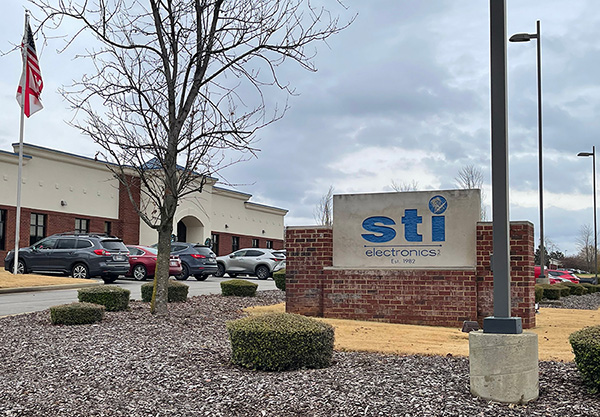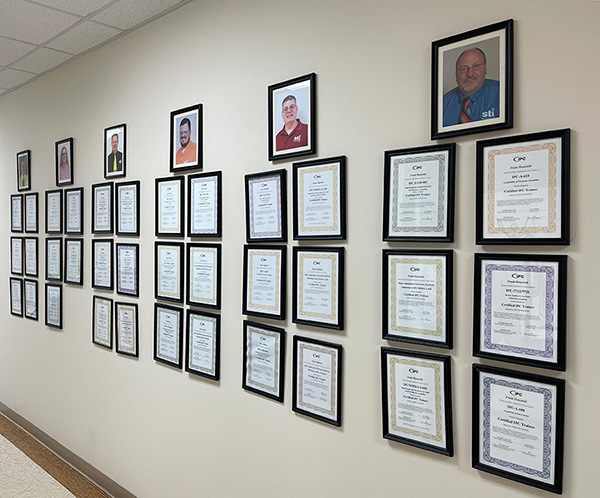‘It’s Got to Work’
STI Electronics prides itself on reliability and training the next generation of workers.
With its home just a few miles from a major military and aerospace testing center, STI Electronics has built a reputation for providing electronics that continue to work through the toughest conditions.
Now in its 43rd year of operation, STI moved to Madison, AL, from California in 1993. The company settled into its current location – just down the road from Redstone Arsenal, a US Army base that houses NASA’s Marshall Space Flight Center and more than 75 federal agencies – in 2008.

Figure 1. STI Electronics moved into its current facility in Madison, AL, in 2008.
With its primary business coming from many of those agencies and the Department of Defense, reliability is where the company has claimed its niche in the industry, said president and CEO David Raby.
He said the company may not win a pricing battle, but the priority for products in those industries is that they need to work reliably, and that’s where STI shines the most.
“In the end, it’s got to work,” he said. “And that’s what we put our reputation on. We build the highest reliability products.”
STI has two SMT lines offering placement capability down to 01005 in size. It has two Juki FX-3 and KE2080-L pick-and-place machines, inline and secondary AOI to ensure accurate placement, a 12-zone oven and a Juki selective solder machine to automate through-hole soldering for higher-volume production. When PCD&F/CIRCUITS ASSEMBLY visited in December, the company was in the process of putting together a third SMT line to expand its production capabilities.
All processes in the facility adhere to AS9100 certification, with manufacturing and inspection following IPC J-STD-001 (Space Addendum). All completed assemblies are washed and visually inspected after each process, and BGA devices are 100% x-ray inspected. The company also offers flying probe testing to detect opens and shorts on the assembly and provide statistical analysis for device tolerances.
With the company already following the strict requirements of aerospace and defense, STI recently expanded into life-critical industrial products, earning ISO 14385 certification to build medical devices.
Raby said many of the requirements for that certification were similar to those for AS9100, with the differences primarily coming in record-keeping, so adding that certification made sense to expand the business and continue its growth.
“We’re doing more medical than we’ve ever done before, and we’re looking at that as part of our growth,” Raby said. “It just fits right in with what we’ve been doing.”
Some of the medical work also makes use of another capability that sets STI apart from its peers: a 2,400 sq. ft. clean room.
That’s an investment that is still growing in use, but is beginning to bear fruit for STI as it branches into new industries, Raby said.
“We don’t have anything that’s built completely in there, but we do have some things that parts of them are built there before they move out onto the floor,” he said.
The company also has an analytical lab to look at any problems that may crop up during production or predict those problems before they can rear their heads.
“It aids us tremendously in our manufacturing,” Raby said.
Along with analyzing its in-house products, STI offers its analytics lab as an outside service for other companies that need to inspect their own products for faults, which provides another source of business and has permitted the lab to mostly pay for itself, Raby said.
‘The Best Trainers in the World’
STI currently has 60 employees and is on the lookout for more, but like most manufacturers, finding workers who are willing and able to do the job can be a challenge, he said.
“Our biggest holdup is just finding qualified people,” he said.
One major advantage the company has over others who are looking for workers is its status as an IPC-authorized training center, offering assembly and solder training courses from a highly trained and accomplished staff, Raby said.

Figure 2. STI’s training staff offers courses in IPC and NASA certifications, as well as its own lesson plans.
“I’m always bragging that we have the best-trained workforce in the world because it’s literally a walk down the hallway to the best trainers in the world,” he said.
The company has six full-time instructors, five in Alabama and one in Indiana, with training classrooms in Madison and Houston, TX. More than 1,000 students come to the Madison facility every year, and instructors also spend a lot of time on the road, traveling to companies to provide training in their facilities, said Diana Bradford, VP of operations/training resources.
STI is also the only private company that offers NASA certifications, with NASA-STD-8739.4 – Crimp Cable & Harness and NASA-STD-8739.1 – Polymeric Application on Electronic Assemblies available for onsite training in Madison.
The company can’t offer every certification that can be earned in a government facility, but its close relationship with the agency and proximity to its largest research center put STI in a unique position among other private training centers, Raby said.
“We’ve got a long history with NASA, especially with Marshall Space Flight Center here, and they have put a lot of trust in Diana and our training staff,” he said. “We’re limited in what we can do, but we can do more than anyone else.”
is managing editor of PCD&F/CIRCUITS ASSEMBLY; tyler@pcea.net.







